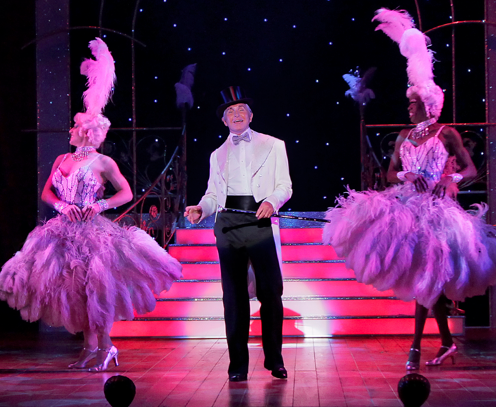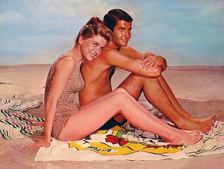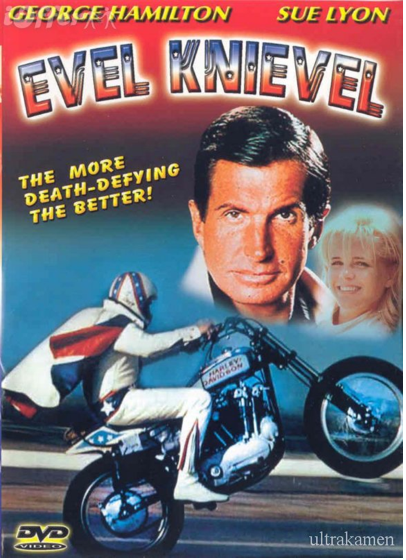George Hamilton is what he is. And what he is— sorry Dos Equis— is the most interesting man in the world. So without further ado here is Memphis’s native suntan and the star of La Cage aux Folles George Hamilton talking about everything but shoe shopping with Imelda Marcos.
Memphis Flyer: We’re looking forward to having you back in Memphis.
(there is a disturbance)
George Hamilton: I’m sorry can you hold on for just a second. (off the phone) Come in? Yes, come in. Do you need me to move? I can go in the other room. (back on the phone) Do not disturb signs: one of my favorite things in the world. The great luxury hotels have really lost something.
Now you have a mini bar. And if you move anything you’ll be charged for it. There’s a sign posted with skulls—”touch a Coca Cola you own it.” And everything is turned away so you have to turn it around just to see what it is. You go looking for what you want to drink and now you own everything in the mini-bar.
I go back to the Peabody hotel.
Memphis Flyer: You spent a lot of time at the Peabody as a kid, right?
George Hamilton: My father was the orchestra leader there and when I was a little boy I knew the ducks personally. In the doors at the Peabody there was like a little closet and you could put your suit in it at night and the valet would pick it up and return it in the morning. Do they still do that?
Memphis Flyer: I have no idea. I’m sure you can have a suit cleaned.
George Hamilton: I don’t know where refuge is. The big house doesn’t work for me. I had a big house. Beverly Hills. 39 rooms with lots of staff and everything. I will never do that again.
I learned to live in really good hotels where do not disturb signs meant do not disturb. In America there were only a very few great hotels and many of them were great from another era. They can all tell you how great they were but not how great they are. Now you have a mini-bar in your room. Or you can go down to the Starbucks. All the style is gone.
And they can’t even pronounce concierge correctly. I call and they say, “Hello, kun-serge.” There was a time when I was convinced that if I ever killed somebody I could simply go to the concierge at the Ritz hotel in Paris and he would say “Not a problem sir, what else?” Those days are gone with the wind.
I’m anachronistically lost from another era.
Memphis Flyer: Both of your parents were in show business and your childhood was— not unusual necessarily— but different. Did that prepare you for the Hollywood lifestyle?
George Hamilton: My mother had this huge lust for life and sense for the outrageous. Most of my early childhood was spent in and around Blytheville, Arkansas and Memphis. My dad gave my mom her first real taste of glamor. That’s not true. She’d been to a boarding school in New York in the 1920’s— Mrs. Simple’s Finishing School— but my father really brought glamor into her life. Bandleaders were the rock stars of the day. She was beguiled by all of it. I married a woman named Alana Stewart. She eventually realized that she wanted that kind of glamor. The glamor of movie stars was on the wane and she wanted a Rock-and-Roll lifestyle. So she married Rod Stewart. I remember seeing her right before that divorce. She had that look only combat veterans get. That million mile stare. That was a whole other era of hedonism.
These days if I walked into the Skyway at the Peabody I would ask for a party of one. The trip within is just this huge thing. I come ready to entertain myself because I see the outrageous in everything.
Memphis Flyer: What was it like having a traveling bandleader for a dad and an actress for a mom?
When I was a little boy I traveled with my mother and father in a bassinet. And I’d hear the band practice. I liked the full sound of the orchestra so they put me down next to the bandstand in the bassinet.
I got used to the realities of my father’s life. He had to be very practical. He had this band with 20-some-odd men or whatever and they would travel everywhere by car. And they would set up every night and do a show. They were an orchestra and dressed in tails to look glamorous. Mother wasn’t practical at all. My father had to be. He had to make the dates, drive the distances, show up and do whatever the job was. You had to have discipline. And I’ve carried that over into my life. My mother, she didn’t have that. She was looking for the next party to happen. It wasn’t about practical or discipline. For her it was “whatever’s just around the corner is what I’m looking for. The next man I meet is going to be the one. It’s all going to happen.” She was always positive about the future. That’s partly because of my grandmother’s faith as a Christian Scientist and my grandfather who was a doctor.
Memphis Flyer: Wait, he was… she was… that doesn’t make any sense at all.
George Hamilton: I know. I don’t know how this combination happened. But it did, and beautifully. My grandfather started thinking, over the course of his life, that no doctor ever really created health or made anything come alive. All he’d done was minister to the sick.
I’ve been in that zone. Changing from “I have to do this” to “I get to do this.” A little thought like can shift your whole focus. It’s like, if somebody asks to take a picture I say of course. I’ve never said no to an autograph or a photo. It’s over in the time it would take you to say no.
Memphis Flyer: So here’s an unusual question: You’ve flown planes, you’ve been circled by sharks, you’ve gone drinking with Robert Mitchum, your romantic adventures are international full of intrigue and well documented. As an actor you’ve played Evel Knievel and gay Zorro. Why aren’t you the pitch man for Dos Equis?
George Hamilton: Ha! I have seen those commercials. But I don’t know. … I’ll tell you something interesting that happened a few nights ago, though. Ten pairs of panties were thrown onstage by ladies in their 70s and 80s. Maybe they think I’m Tom Jones? Chris Sieber plays Albin in the show, and he can’t let that go. He bends down, gets a pair, and put them on. On the back it was written, “Mary Anne, call me.” And her number.
And it’s wonderful These people grew up with you. Children were probably conceived near or around one of your films.
Memphis Flyer: Elvis’s manager Col. Tom Parker is probably one of the most elusive personalities in the history of showbusiness. He was also the best man at your wedding. Can you tell me what he was really like?
George Hamilton: I was at MGM in late 50’s doing Home from the Hill with Robert Mitchum. I was told “You’re about to begin at top of the chain.” The movie was directed by Vincente Minnelli and there was going to be a major push. It was the end of an era. Studios were still about contract players and we all worked as chattel.
The first day I walked onto commissary was amazing. There was the inner sanctum. Fred Astaire was sitting there and Carry Grant and Clark Gable and Gary Cooper and Robert Mitchum who I’m working with.
Robert told me, “They say I don’t know my lines but it’s not true. I know ‘em I’m just to drunk to say ‘em.”
Memphis Flyer: He took you out drinking that night, right?
George Hamilton: There was a bar around corner from MGM. He said the trick wasn’t to get up early and go to the studio it was to stay up late and then go in and get it done. He made me stay up all night. We went from the bar to the studio. He told me to lie down on a camera blanket. He got a camera blanket from another camera and we slept for about an hour. When they woke us up they gave him a Bloody Mary and they gave me a razor.
Anyway I was told that I’d need someone to guide me through this labyrinth of Hollywood. Because the studio’s going to take over and there was this man who worked at MGM—Jenson Moses—who said Col. Tom Parker’s the guy for you. He handles Elvis Presley. Having him would be a great help. So I called Col. Tom and he said, “Son I understand what you want and I understand what you need but let me just put it this way: Anything I CAN do for you I SHOULD be doing for Elvis. If you ever get to Hollywood — I was finishing up the picture and on the road you see — call me. I’m at MGM studios. Well, we we got back from location in a few weeks and I was at MGM and I saw Elvis Presley and Tom Parker.
The Colonel said he already had the right deal for me. “See these elephants,” he asked. And there were literally 1000 elephants there. They were made of paper-mache or something. With fuzzy things. It was all Carnival stuff. I’d never seen anything like it. Anyway, he said, “All of these elephants are all being sold today and you are the lucky buyer. You’re going to get all of these elephants here for just over $1000.”
I sat there thinking this man was crazy. Then I said okay. He said, “We’ve got a deal. It’s the first deal you’ve made with me and I’ll buy you lunch out of the profits.” Then he looked around and said, “boys, we’ve got a live one.”
So we ate lunch. It was all heavy Southern food. And while we were eating people packed these elephants in boxes. And it settled in that I had to give Col. Tom a thousand dollars. For elephants. What the hell was I going to do with elephants?
I called my brother who was a decorator and said “Hey — Ummmm — So look. I bought all of these elephants from Tom Parker— That’s Elvis’s manager you see. My brother asked if Elvis could sign them but the Colonel said that was a whole other deal and would cost a lot more money. So I asked Col. Tom if he would sign them and he said he could do one or two but not all of them. “That would take too much time and I’ve got arthritis,” he said.
My brother was decorating condominiums in Palm Springs. And he actually managed to place every single one of those elephants in the condominiums he was working on. I doubled my money. Doubled it at least. So I went back to the Colonel and asked him if he had any more of those elephants to sell because my brother and I sold all the ones I’d bought from him.
Col. Tom said, “Now you’re worthy to sit down and talk business with me.” And we became the best friends. I moved next to him in Palm Springs. He convinced me to marry my wife. “Woman’s smarter than you,” he said. “And I can get it all done in Las Vegas tonight but I want to be home by the evening news.”
I went to my girlfriend and told her that if she wanted to get married we’d have to get married now. So we got married in Elvis’s suite at the International.
Elvis was smart. He was not a dumb guy. He’d come over and sing gospel music and we’d have dinner. And I was at his funeral some years later. I flew in on his airplane the Lisa Marie with the Sweet Inspirations. That was a freaky day when we took him out of Graceland to the cemetery and we were all in the white limousines. A very, very freaky day. Things happened that I’ll never forget. The stewardess on the plane told me that his milkshake mug broke that day on landing. And when they picked me up they said the blanket in back, in his bed had caught fire. And I saw for myself, when they brought his body out of Graceland this huge branch of a tree just cracked. Not some little willow. There was a weird energy happening there and you could feel it. After the funeral we all went back to Graceland and sat around. Sam Phillips and those guys were there.
George and Dracula have a few things in common. (a clip with Sherman Hemsley)
Memphis Flyer: I made a list of things I wouldn’t ask you about: Your tan, Imelda Marcos, your stepmother. So far I’m doing a pretty good job of not bringing that stuff up.
George Hamilton: Ask me anything.
Memphis Flyer: We should probably talk about La Cage, which is coming to the Orpheum. With you in it, I hear.
George Hamilton: Okay, we can do that.
Memphis Flyer: La Cage aux Folles is a great political farce but also great cabaret and a beautiful love story. What appeals to you the most?
George Hamilton: You have to ask yourself, “What am I doing?” Am I an activist with messages I’m trying to deliver? We were told at MGM not to do that speciffically. We were never supposed to wear any kind of medal that was religious. You couldn’t take sides in things that would separate your audience. We were there to entertain not to use the bully pulpit.
I wanted to go to Broadway again. I’d had two offers to do other shows but this one seemed to be more of a challenge. The universal story isn’t about the gay world it’s about being who you are and being faithful to that. My brother was gay. When I went to see him at the end of his life I asked him if he’d do anything differently if he could do it all over again. He said he’d love more.
When people come to see this show they respond to the universal things— the loss of a son getting married. Two people devoted to each other being tested. Gay or straight didn’t matter. Not like it would in the 1970’s when gays had so much trouble having any kind of relationship openly. There’s a lot of pain involved in that.
What I liked was that this was something quite beautiful and the music was extraordinary.
Something extraordinary
To see me gabbing about La Cage (and other Orpheum shows) click here. For showtimes and ticket information click here.



